BUS832: Analysis of Narev's Leadership at Commonwealth Bank
VerifiedAdded on 2023/06/07
|8
|1944
|247
Essay
AI Summary
This essay critically analyzes Ian Narev's leadership and the broader leadership culture at the Commonwealth Bank of Australia (CBA) during his tenure from 2011 to 2018, examining the impact of his leadership style on organizational innovation and ethical conduct. The essay delves into the concept of transformational and creative leadership, highlighting their significance in fostering innovation within companies. It explores the positive relationship between transformational leadership and innovation, citing studies that demonstrate its impact on company innovation, particularly in research and development. The essay further examines the role of creative leadership in promoting imagination and inventive qualities within the organization. The essay then scrutinizes the ethical scandals that plagued CBA during Narev's tenure, including unethical behavior by financial planners, a culture of commission-based incentives, and attempts to cover up misconduct. It also discusses the bank's responses to these scandals, including compensation programs and changes to management and systems. The essay concludes by emphasizing the importance of corporate culture, ethics, and strong leadership in organizational success, particularly in fostering creativity and innovation.
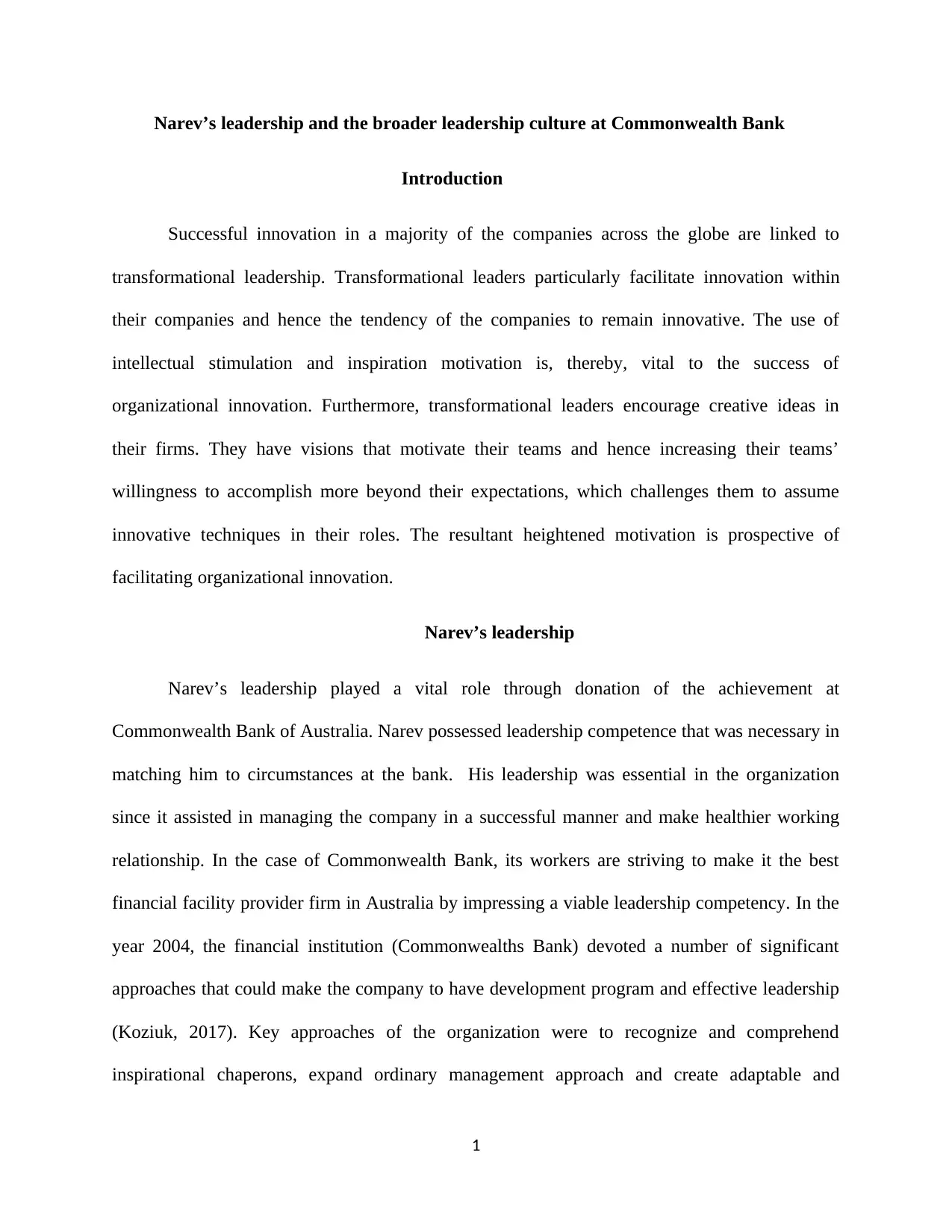
Narev’s leadership and the broader leadership culture at Commonwealth Bank
Introduction
Successful innovation in a majority of the companies across the globe are linked to
transformational leadership. Transformational leaders particularly facilitate innovation within
their companies and hence the tendency of the companies to remain innovative. The use of
intellectual stimulation and inspiration motivation is, thereby, vital to the success of
organizational innovation. Furthermore, transformational leaders encourage creative ideas in
their firms. They have visions that motivate their teams and hence increasing their teams’
willingness to accomplish more beyond their expectations, which challenges them to assume
innovative techniques in their roles. The resultant heightened motivation is prospective of
facilitating organizational innovation.
Narev’s leadership
Narev’s leadership played a vital role through donation of the achievement at
Commonwealth Bank of Australia. Narev possessed leadership competence that was necessary in
matching him to circumstances at the bank. His leadership was essential in the organization
since it assisted in managing the company in a successful manner and make healthier working
relationship. In the case of Commonwealth Bank, its workers are striving to make it the best
financial facility provider firm in Australia by impressing a viable leadership competency. In the
year 2004, the financial institution (Commonwealths Bank) devoted a number of significant
approaches that could make the company to have development program and effective leadership
(Koziuk, 2017). Key approaches of the organization were to recognize and comprehend
inspirational chaperons, expand ordinary management approach and create adaptable and
1
Introduction
Successful innovation in a majority of the companies across the globe are linked to
transformational leadership. Transformational leaders particularly facilitate innovation within
their companies and hence the tendency of the companies to remain innovative. The use of
intellectual stimulation and inspiration motivation is, thereby, vital to the success of
organizational innovation. Furthermore, transformational leaders encourage creative ideas in
their firms. They have visions that motivate their teams and hence increasing their teams’
willingness to accomplish more beyond their expectations, which challenges them to assume
innovative techniques in their roles. The resultant heightened motivation is prospective of
facilitating organizational innovation.
Narev’s leadership
Narev’s leadership played a vital role through donation of the achievement at
Commonwealth Bank of Australia. Narev possessed leadership competence that was necessary in
matching him to circumstances at the bank. His leadership was essential in the organization
since it assisted in managing the company in a successful manner and make healthier working
relationship. In the case of Commonwealth Bank, its workers are striving to make it the best
financial facility provider firm in Australia by impressing a viable leadership competency. In the
year 2004, the financial institution (Commonwealths Bank) devoted a number of significant
approaches that could make the company to have development program and effective leadership
(Koziuk, 2017). Key approaches of the organization were to recognize and comprehend
inspirational chaperons, expand ordinary management approach and create adaptable and
1
Paraphrase This Document
Need a fresh take? Get an instant paraphrase of this document with our AI Paraphraser
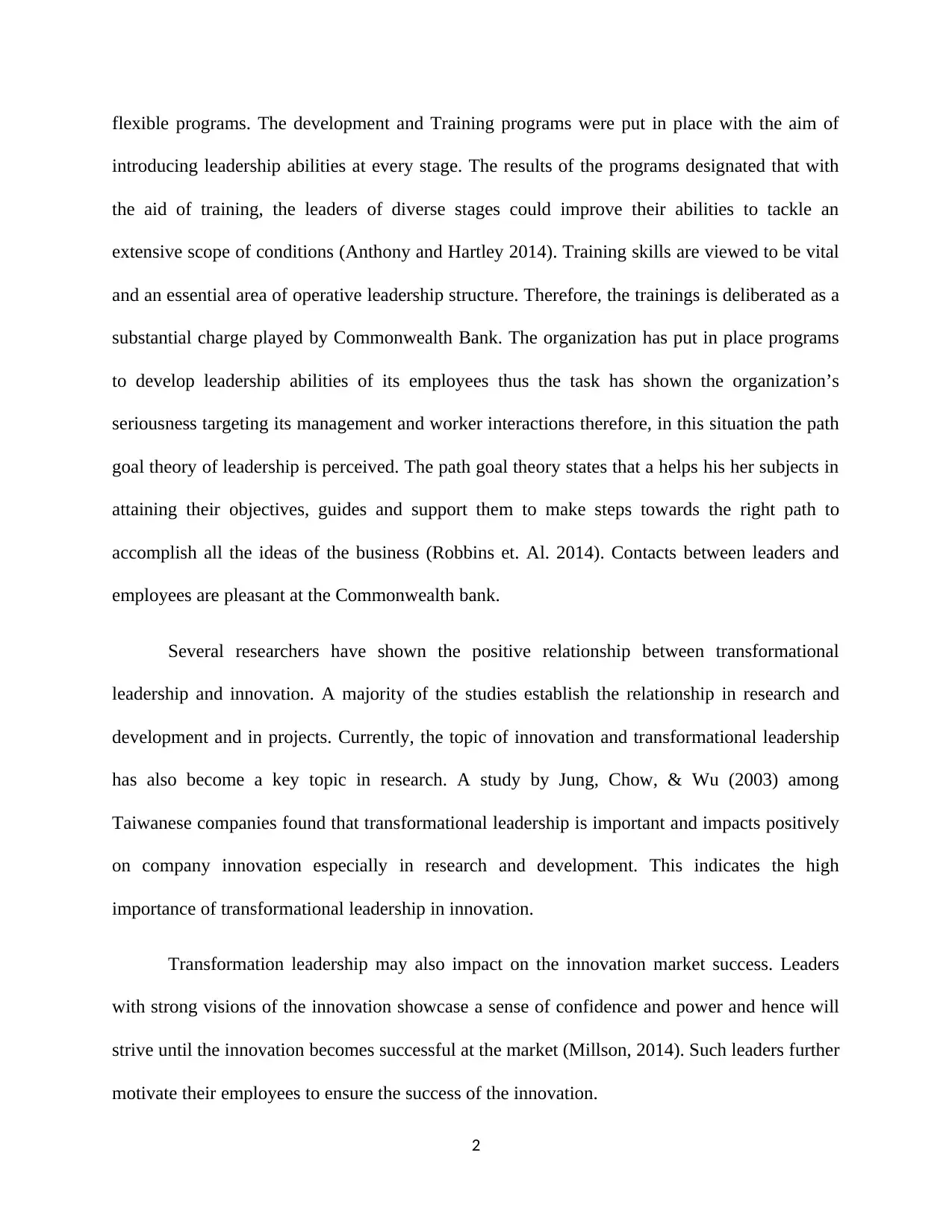
flexible programs. The development and Training programs were put in place with the aim of
introducing leadership abilities at every stage. The results of the programs designated that with
the aid of training, the leaders of diverse stages could improve their abilities to tackle an
extensive scope of conditions (Anthony and Hartley 2014). Training skills are viewed to be vital
and an essential area of operative leadership structure. Therefore, the trainings is deliberated as a
substantial charge played by Commonwealth Bank. The organization has put in place programs
to develop leadership abilities of its employees thus the task has shown the organization’s
seriousness targeting its management and worker interactions therefore, in this situation the path
goal theory of leadership is perceived. The path goal theory states that a helps his her subjects in
attaining their objectives, guides and support them to make steps towards the right path to
accomplish all the ideas of the business (Robbins et. Al. 2014). Contacts between leaders and
employees are pleasant at the Commonwealth bank.
Several researchers have shown the positive relationship between transformational
leadership and innovation. A majority of the studies establish the relationship in research and
development and in projects. Currently, the topic of innovation and transformational leadership
has also become a key topic in research. A study by Jung, Chow, & Wu (2003) among
Taiwanese companies found that transformational leadership is important and impacts positively
on company innovation especially in research and development. This indicates the high
importance of transformational leadership in innovation.
Transformation leadership may also impact on the innovation market success. Leaders
with strong visions of the innovation showcase a sense of confidence and power and hence will
strive until the innovation becomes successful at the market (Millson, 2014). Such leaders further
motivate their employees to ensure the success of the innovation.
2
introducing leadership abilities at every stage. The results of the programs designated that with
the aid of training, the leaders of diverse stages could improve their abilities to tackle an
extensive scope of conditions (Anthony and Hartley 2014). Training skills are viewed to be vital
and an essential area of operative leadership structure. Therefore, the trainings is deliberated as a
substantial charge played by Commonwealth Bank. The organization has put in place programs
to develop leadership abilities of its employees thus the task has shown the organization’s
seriousness targeting its management and worker interactions therefore, in this situation the path
goal theory of leadership is perceived. The path goal theory states that a helps his her subjects in
attaining their objectives, guides and support them to make steps towards the right path to
accomplish all the ideas of the business (Robbins et. Al. 2014). Contacts between leaders and
employees are pleasant at the Commonwealth bank.
Several researchers have shown the positive relationship between transformational
leadership and innovation. A majority of the studies establish the relationship in research and
development and in projects. Currently, the topic of innovation and transformational leadership
has also become a key topic in research. A study by Jung, Chow, & Wu (2003) among
Taiwanese companies found that transformational leadership is important and impacts positively
on company innovation especially in research and development. This indicates the high
importance of transformational leadership in innovation.
Transformation leadership may also impact on the innovation market success. Leaders
with strong visions of the innovation showcase a sense of confidence and power and hence will
strive until the innovation becomes successful at the market (Millson, 2014). Such leaders further
motivate their employees to ensure the success of the innovation.
2
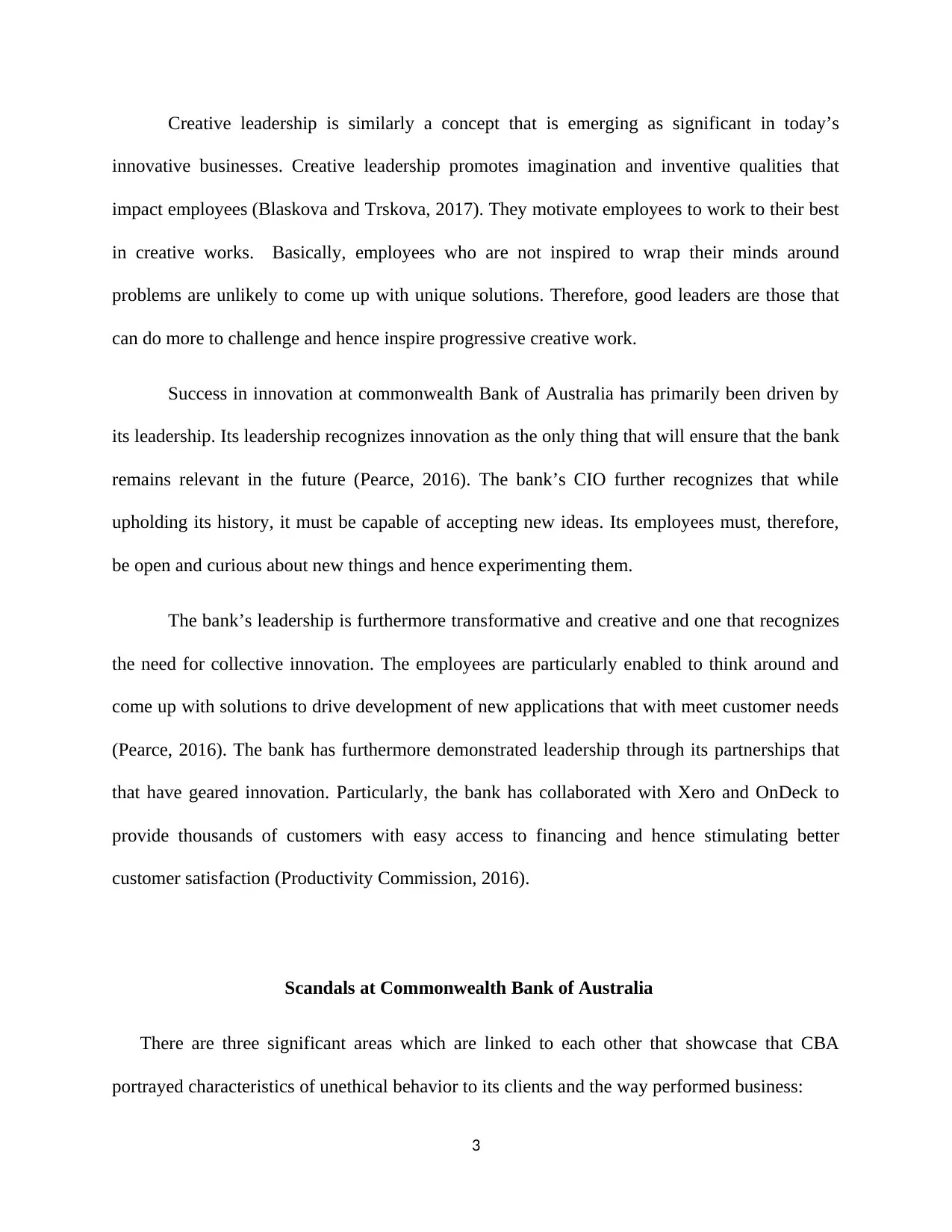
Creative leadership is similarly a concept that is emerging as significant in today’s
innovative businesses. Creative leadership promotes imagination and inventive qualities that
impact employees (Blaskova and Trskova, 2017). They motivate employees to work to their best
in creative works. Basically, employees who are not inspired to wrap their minds around
problems are unlikely to come up with unique solutions. Therefore, good leaders are those that
can do more to challenge and hence inspire progressive creative work.
Success in innovation at commonwealth Bank of Australia has primarily been driven by
its leadership. Its leadership recognizes innovation as the only thing that will ensure that the bank
remains relevant in the future (Pearce, 2016). The bank’s CIO further recognizes that while
upholding its history, it must be capable of accepting new ideas. Its employees must, therefore,
be open and curious about new things and hence experimenting them.
The bank’s leadership is furthermore transformative and creative and one that recognizes
the need for collective innovation. The employees are particularly enabled to think around and
come up with solutions to drive development of new applications that with meet customer needs
(Pearce, 2016). The bank has furthermore demonstrated leadership through its partnerships that
that have geared innovation. Particularly, the bank has collaborated with Xero and OnDeck to
provide thousands of customers with easy access to financing and hence stimulating better
customer satisfaction (Productivity Commission, 2016).
Scandals at Commonwealth Bank of Australia
There are three significant areas which are linked to each other that showcase that CBA
portrayed characteristics of unethical behavior to its clients and the way performed business:
3
innovative businesses. Creative leadership promotes imagination and inventive qualities that
impact employees (Blaskova and Trskova, 2017). They motivate employees to work to their best
in creative works. Basically, employees who are not inspired to wrap their minds around
problems are unlikely to come up with unique solutions. Therefore, good leaders are those that
can do more to challenge and hence inspire progressive creative work.
Success in innovation at commonwealth Bank of Australia has primarily been driven by
its leadership. Its leadership recognizes innovation as the only thing that will ensure that the bank
remains relevant in the future (Pearce, 2016). The bank’s CIO further recognizes that while
upholding its history, it must be capable of accepting new ideas. Its employees must, therefore,
be open and curious about new things and hence experimenting them.
The bank’s leadership is furthermore transformative and creative and one that recognizes
the need for collective innovation. The employees are particularly enabled to think around and
come up with solutions to drive development of new applications that with meet customer needs
(Pearce, 2016). The bank has furthermore demonstrated leadership through its partnerships that
that have geared innovation. Particularly, the bank has collaborated with Xero and OnDeck to
provide thousands of customers with easy access to financing and hence stimulating better
customer satisfaction (Productivity Commission, 2016).
Scandals at Commonwealth Bank of Australia
There are three significant areas which are linked to each other that showcase that CBA
portrayed characteristics of unethical behavior to its clients and the way performed business:
3
⊘ This is a preview!⊘
Do you want full access?
Subscribe today to unlock all pages.

Trusted by 1+ million students worldwide
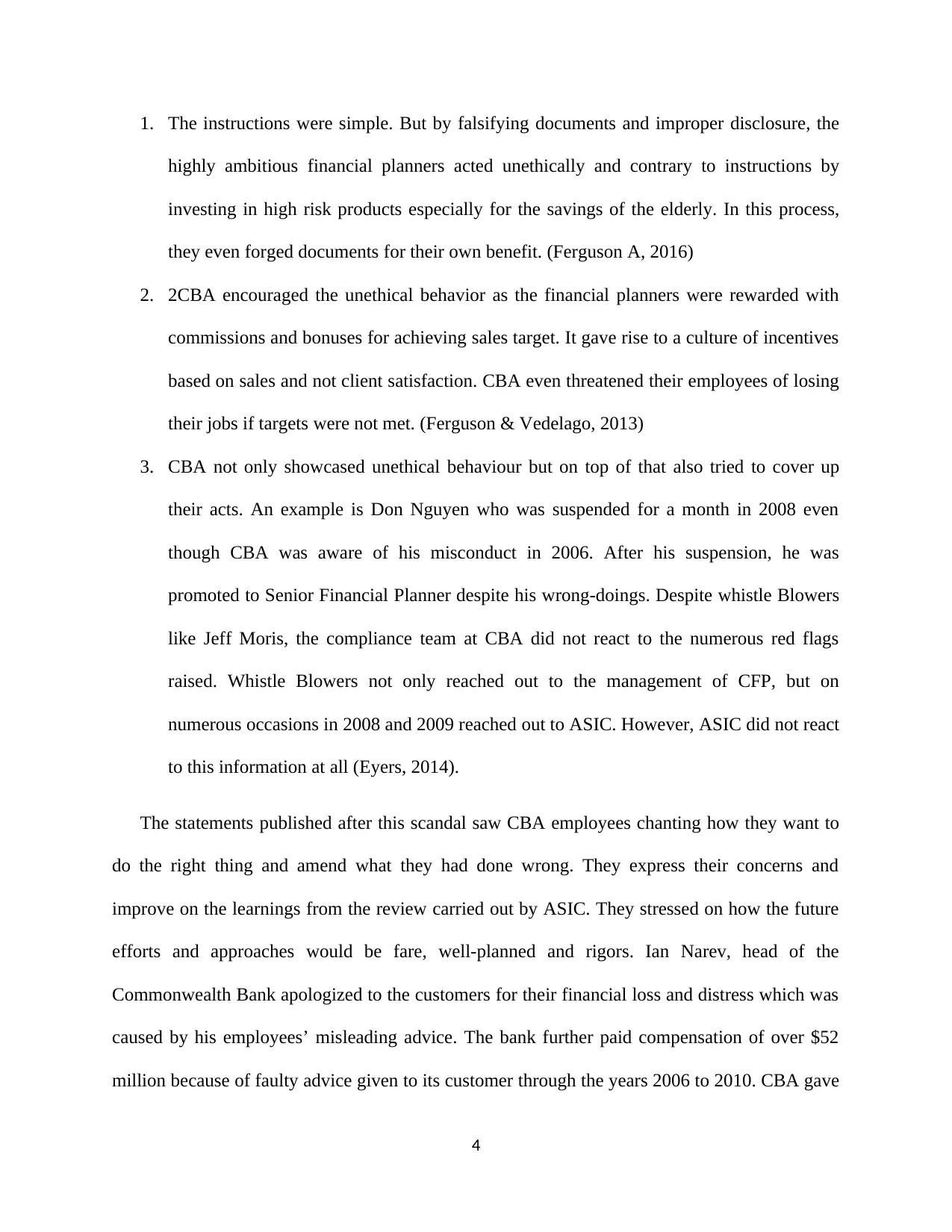
1. The instructions were simple. But by falsifying documents and improper disclosure, the
highly ambitious financial planners acted unethically and contrary to instructions by
investing in high risk products especially for the savings of the elderly. In this process,
they even forged documents for their own benefit. (Ferguson A, 2016)
2. 2CBA encouraged the unethical behavior as the financial planners were rewarded with
commissions and bonuses for achieving sales target. It gave rise to a culture of incentives
based on sales and not client satisfaction. CBA even threatened their employees of losing
their jobs if targets were not met. (Ferguson & Vedelago, 2013)
3. CBA not only showcased unethical behaviour but on top of that also tried to cover up
their acts. An example is Don Nguyen who was suspended for a month in 2008 even
though CBA was aware of his misconduct in 2006. After his suspension, he was
promoted to Senior Financial Planner despite his wrong-doings. Despite whistle Blowers
like Jeff Moris, the compliance team at CBA did not react to the numerous red flags
raised. Whistle Blowers not only reached out to the management of CFP, but on
numerous occasions in 2008 and 2009 reached out to ASIC. However, ASIC did not react
to this information at all (Eyers, 2014).
The statements published after this scandal saw CBA employees chanting how they want to
do the right thing and amend what they had done wrong. They express their concerns and
improve on the learnings from the review carried out by ASIC. They stressed on how the future
efforts and approaches would be fare, well-planned and rigors. Ian Narev, head of the
Commonwealth Bank apologized to the customers for their financial loss and distress which was
caused by his employees’ misleading advice. The bank further paid compensation of over $52
million because of faulty advice given to its customer through the years 2006 to 2010. CBA gave
4
highly ambitious financial planners acted unethically and contrary to instructions by
investing in high risk products especially for the savings of the elderly. In this process,
they even forged documents for their own benefit. (Ferguson A, 2016)
2. 2CBA encouraged the unethical behavior as the financial planners were rewarded with
commissions and bonuses for achieving sales target. It gave rise to a culture of incentives
based on sales and not client satisfaction. CBA even threatened their employees of losing
their jobs if targets were not met. (Ferguson & Vedelago, 2013)
3. CBA not only showcased unethical behaviour but on top of that also tried to cover up
their acts. An example is Don Nguyen who was suspended for a month in 2008 even
though CBA was aware of his misconduct in 2006. After his suspension, he was
promoted to Senior Financial Planner despite his wrong-doings. Despite whistle Blowers
like Jeff Moris, the compliance team at CBA did not react to the numerous red flags
raised. Whistle Blowers not only reached out to the management of CFP, but on
numerous occasions in 2008 and 2009 reached out to ASIC. However, ASIC did not react
to this information at all (Eyers, 2014).
The statements published after this scandal saw CBA employees chanting how they want to
do the right thing and amend what they had done wrong. They express their concerns and
improve on the learnings from the review carried out by ASIC. They stressed on how the future
efforts and approaches would be fare, well-planned and rigors. Ian Narev, head of the
Commonwealth Bank apologized to the customers for their financial loss and distress which was
caused by his employees’ misleading advice. The bank further paid compensation of over $52
million because of faulty advice given to its customer through the years 2006 to 2010. CBA gave
4
Paraphrase This Document
Need a fresh take? Get an instant paraphrase of this document with our AI Paraphraser
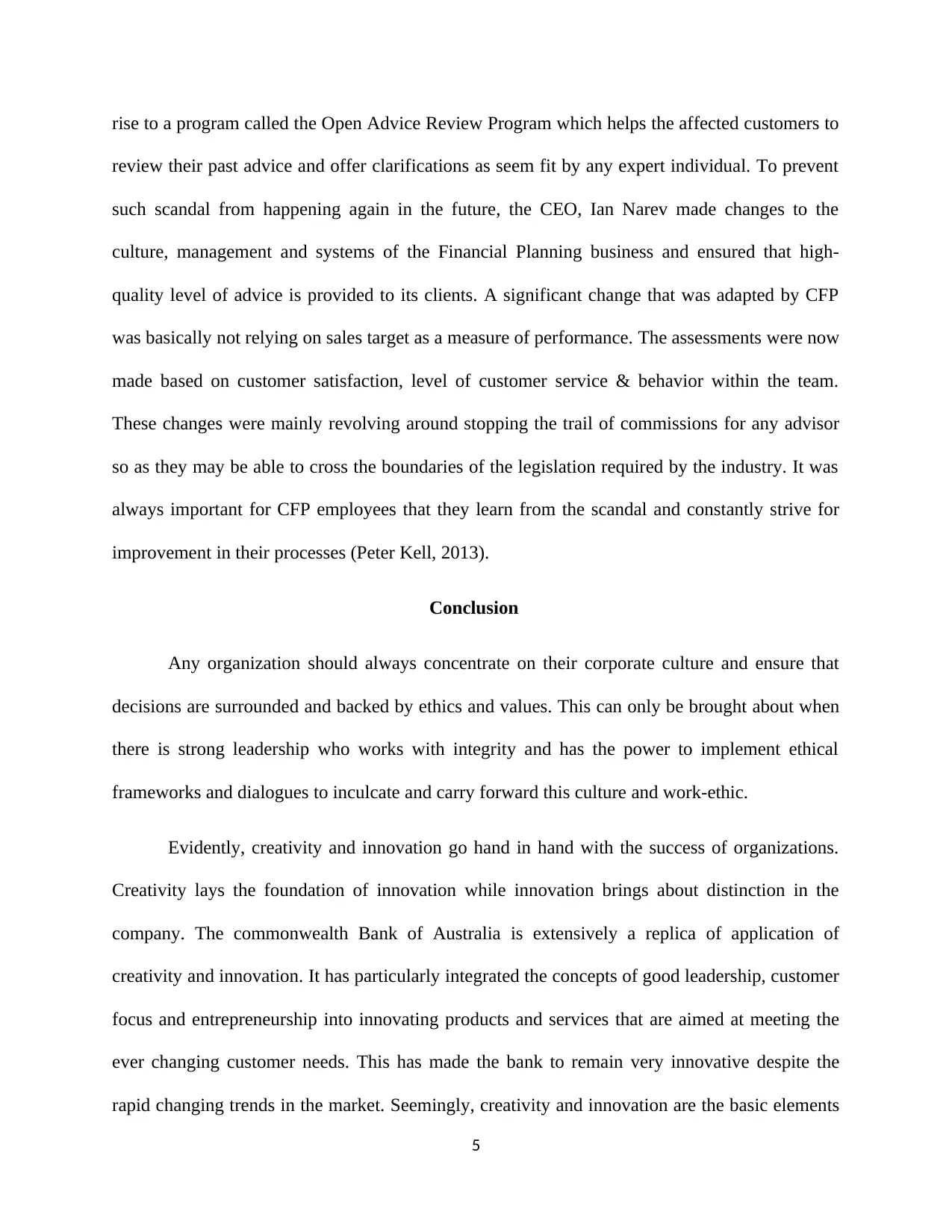
rise to a program called the Open Advice Review Program which helps the affected customers to
review their past advice and offer clarifications as seem fit by any expert individual. To prevent
such scandal from happening again in the future, the CEO, Ian Narev made changes to the
culture, management and systems of the Financial Planning business and ensured that high-
quality level of advice is provided to its clients. A significant change that was adapted by CFP
was basically not relying on sales target as a measure of performance. The assessments were now
made based on customer satisfaction, level of customer service & behavior within the team.
These changes were mainly revolving around stopping the trail of commissions for any advisor
so as they may be able to cross the boundaries of the legislation required by the industry. It was
always important for CFP employees that they learn from the scandal and constantly strive for
improvement in their processes (Peter Kell, 2013).
Conclusion
Any organization should always concentrate on their corporate culture and ensure that
decisions are surrounded and backed by ethics and values. This can only be brought about when
there is strong leadership who works with integrity and has the power to implement ethical
frameworks and dialogues to inculcate and carry forward this culture and work-ethic.
Evidently, creativity and innovation go hand in hand with the success of organizations.
Creativity lays the foundation of innovation while innovation brings about distinction in the
company. The commonwealth Bank of Australia is extensively a replica of application of
creativity and innovation. It has particularly integrated the concepts of good leadership, customer
focus and entrepreneurship into innovating products and services that are aimed at meeting the
ever changing customer needs. This has made the bank to remain very innovative despite the
rapid changing trends in the market. Seemingly, creativity and innovation are the basic elements
5
review their past advice and offer clarifications as seem fit by any expert individual. To prevent
such scandal from happening again in the future, the CEO, Ian Narev made changes to the
culture, management and systems of the Financial Planning business and ensured that high-
quality level of advice is provided to its clients. A significant change that was adapted by CFP
was basically not relying on sales target as a measure of performance. The assessments were now
made based on customer satisfaction, level of customer service & behavior within the team.
These changes were mainly revolving around stopping the trail of commissions for any advisor
so as they may be able to cross the boundaries of the legislation required by the industry. It was
always important for CFP employees that they learn from the scandal and constantly strive for
improvement in their processes (Peter Kell, 2013).
Conclusion
Any organization should always concentrate on their corporate culture and ensure that
decisions are surrounded and backed by ethics and values. This can only be brought about when
there is strong leadership who works with integrity and has the power to implement ethical
frameworks and dialogues to inculcate and carry forward this culture and work-ethic.
Evidently, creativity and innovation go hand in hand with the success of organizations.
Creativity lays the foundation of innovation while innovation brings about distinction in the
company. The commonwealth Bank of Australia is extensively a replica of application of
creativity and innovation. It has particularly integrated the concepts of good leadership, customer
focus and entrepreneurship into innovating products and services that are aimed at meeting the
ever changing customer needs. This has made the bank to remain very innovative despite the
rapid changing trends in the market. Seemingly, creativity and innovation are the basic elements
5
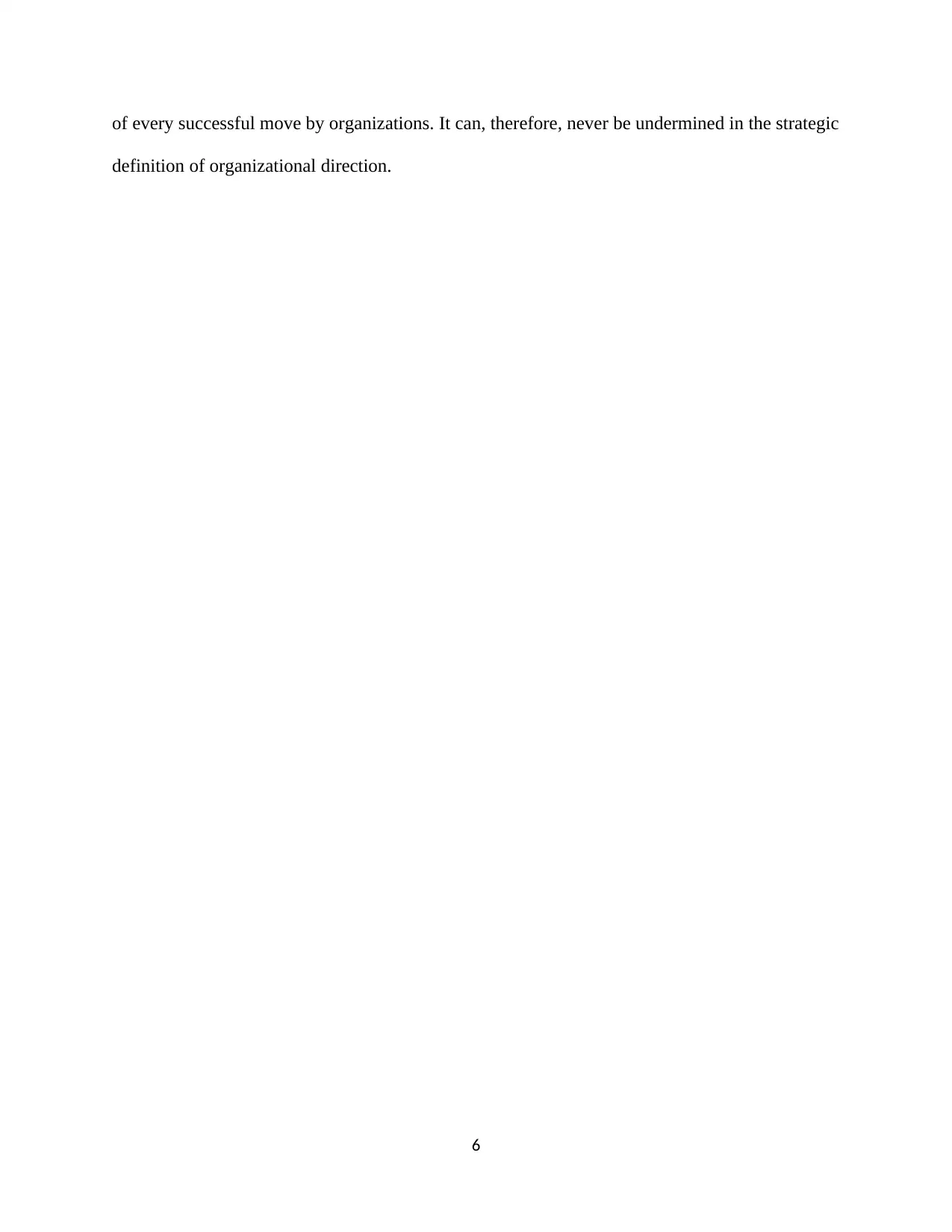
of every successful move by organizations. It can, therefore, never be undermined in the strategic
definition of organizational direction.
6
definition of organizational direction.
6
⊘ This is a preview!⊘
Do you want full access?
Subscribe today to unlock all pages.

Trusted by 1+ million students worldwide
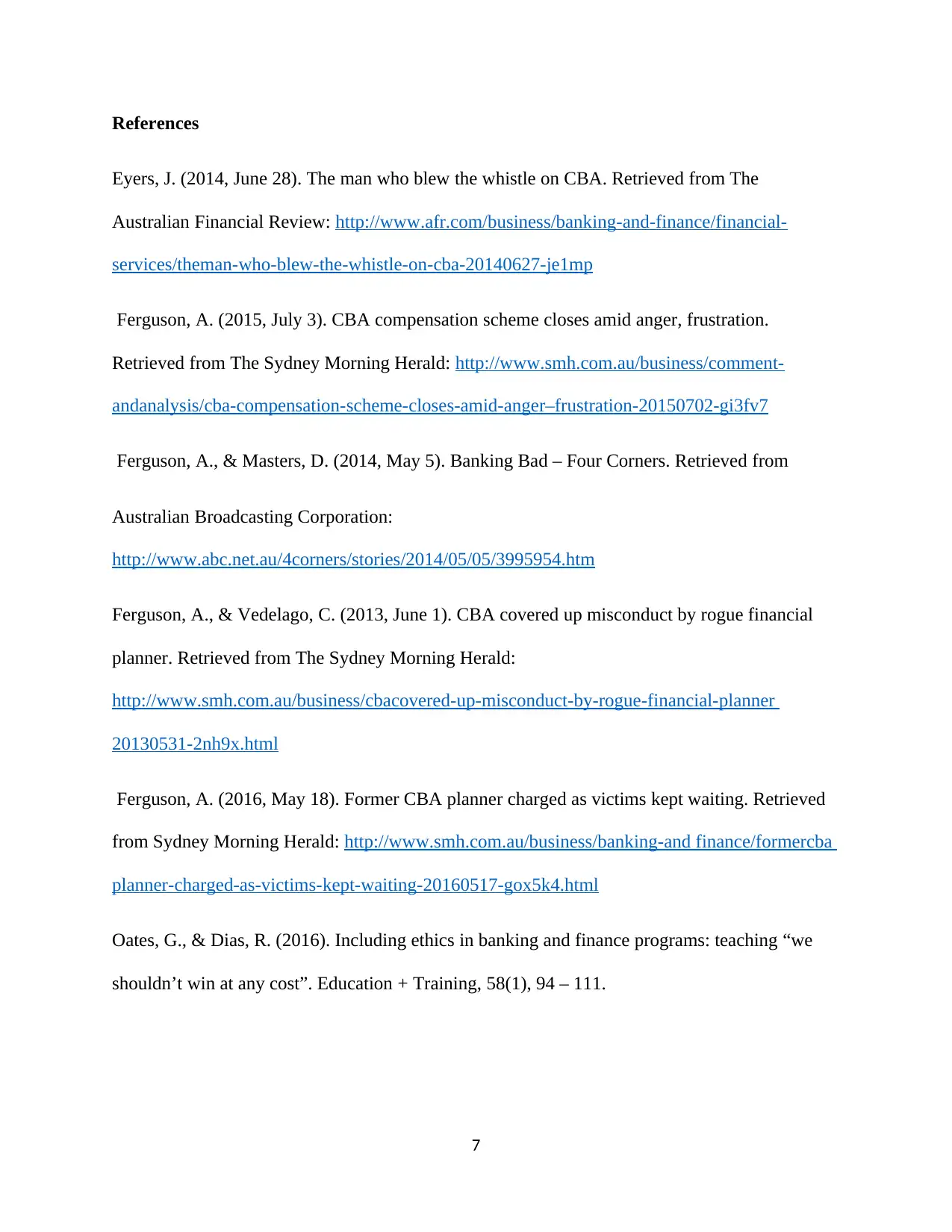
References
Eyers, J. (2014, June 28). The man who blew the whistle on CBA. Retrieved from The
Australian Financial Review: http://www.afr.com/business/banking-and-finance/financial-
services/theman-who-blew-the-whistle-on-cba-20140627-je1mp
Ferguson, A. (2015, July 3). CBA compensation scheme closes amid anger, frustration.
Retrieved from The Sydney Morning Herald: http://www.smh.com.au/business/comment-
andanalysis/cba-compensation-scheme-closes-amid-anger–frustration-20150702-gi3fv7
Ferguson, A., & Masters, D. (2014, May 5). Banking Bad – Four Corners. Retrieved from
Australian Broadcasting Corporation:
http://www.abc.net.au/4corners/stories/2014/05/05/3995954.htm
Ferguson, A., & Vedelago, C. (2013, June 1). CBA covered up misconduct by rogue financial
planner. Retrieved from The Sydney Morning Herald:
http://www.smh.com.au/business/cbacovered-up-misconduct-by-rogue-financial-planner
20130531-2nh9x.html
Ferguson, A. (2016, May 18). Former CBA planner charged as victims kept waiting. Retrieved
from Sydney Morning Herald: http://www.smh.com.au/business/banking-and finance/formercba
planner-charged-as-victims-kept-waiting-20160517-gox5k4.html
Oates, G., & Dias, R. (2016). Including ethics in banking and finance programs: teaching “we
shouldn’t win at any cost”. Education + Training, 58(1), 94 – 111.
7
Eyers, J. (2014, June 28). The man who blew the whistle on CBA. Retrieved from The
Australian Financial Review: http://www.afr.com/business/banking-and-finance/financial-
services/theman-who-blew-the-whistle-on-cba-20140627-je1mp
Ferguson, A. (2015, July 3). CBA compensation scheme closes amid anger, frustration.
Retrieved from The Sydney Morning Herald: http://www.smh.com.au/business/comment-
andanalysis/cba-compensation-scheme-closes-amid-anger–frustration-20150702-gi3fv7
Ferguson, A., & Masters, D. (2014, May 5). Banking Bad – Four Corners. Retrieved from
Australian Broadcasting Corporation:
http://www.abc.net.au/4corners/stories/2014/05/05/3995954.htm
Ferguson, A., & Vedelago, C. (2013, June 1). CBA covered up misconduct by rogue financial
planner. Retrieved from The Sydney Morning Herald:
http://www.smh.com.au/business/cbacovered-up-misconduct-by-rogue-financial-planner
20130531-2nh9x.html
Ferguson, A. (2016, May 18). Former CBA planner charged as victims kept waiting. Retrieved
from Sydney Morning Herald: http://www.smh.com.au/business/banking-and finance/formercba
planner-charged-as-victims-kept-waiting-20160517-gox5k4.html
Oates, G., & Dias, R. (2016). Including ethics in banking and finance programs: teaching “we
shouldn’t win at any cost”. Education + Training, 58(1), 94 – 111.
7
Paraphrase This Document
Need a fresh take? Get an instant paraphrase of this document with our AI Paraphraser
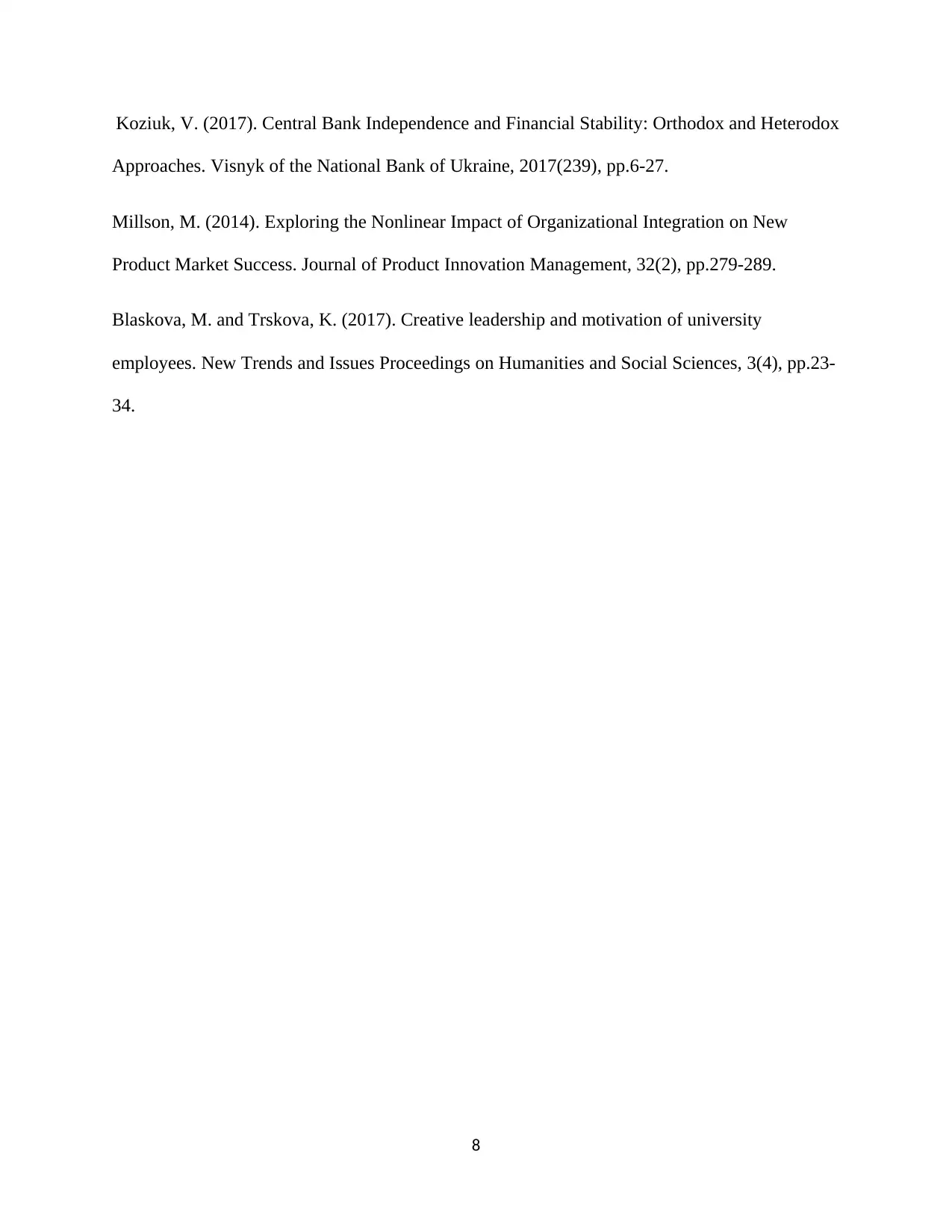
Koziuk, V. (2017). Central Bank Independence and Financial Stability: Orthodox and Heterodox
Approaches. Visnyk of the National Bank of Ukraine, 2017(239), pp.6-27.
Millson, M. (2014). Exploring the Nonlinear Impact of Organizational Integration on New
Product Market Success. Journal of Product Innovation Management, 32(2), pp.279-289.
Blaskova, M. and Trskova, K. (2017). Creative leadership and motivation of university
employees. New Trends and Issues Proceedings on Humanities and Social Sciences, 3(4), pp.23-
34.
8
Approaches. Visnyk of the National Bank of Ukraine, 2017(239), pp.6-27.
Millson, M. (2014). Exploring the Nonlinear Impact of Organizational Integration on New
Product Market Success. Journal of Product Innovation Management, 32(2), pp.279-289.
Blaskova, M. and Trskova, K. (2017). Creative leadership and motivation of university
employees. New Trends and Issues Proceedings on Humanities and Social Sciences, 3(4), pp.23-
34.
8
1 out of 8
Related Documents
Your All-in-One AI-Powered Toolkit for Academic Success.
+13062052269
info@desklib.com
Available 24*7 on WhatsApp / Email
![[object Object]](/_next/static/media/star-bottom.7253800d.svg)
Unlock your academic potential
Copyright © 2020–2026 A2Z Services. All Rights Reserved. Developed and managed by ZUCOL.





